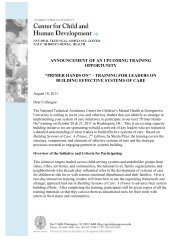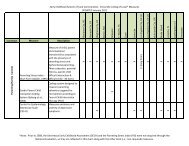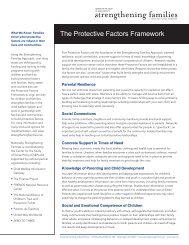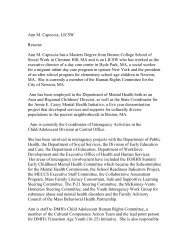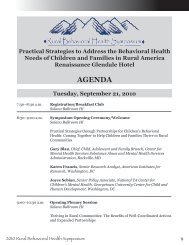Training Institutes 2012 - National Technical Assistance Center for ...
Training Institutes 2012 - National Technical Assistance Center for ...
Training Institutes 2012 - National Technical Assistance Center for ...
Create successful ePaper yourself
Turn your PDF publications into a flip-book with our unique Google optimized e-Paper software.
• Strategies and tools <strong>for</strong> engaging primary care providers in a system of care approach, including provider tip sheets,<br />
referral systems, micro-trainings, and satisfaction surveys<br />
• Discussion of the policy context <strong>for</strong> making the pediatric medical homes a hub <strong>for</strong> sustainable, integrated behavioral<br />
health services in an environment of changing healthcare systems<br />
Participants will have the opportunity to apply the quality improvement process to their own community, identifying a<br />
specific, measurable goal <strong>for</strong> engaging primary care providers in their systems approach. The faculty team includes the<br />
perspectives of two senior administrators of public health agencies. Additional perspectives to be incorporated include<br />
those of a lead family contact, medical doctor, and early childhood mental health clinician.<br />
MODERATOR/PRESENTER: Kathleen Betts, M.P.H., Deputy Assistant Secretary, Massachusetts Executive Office<br />
of Health and Human Services, Boston, MA<br />
Deborah Allen, Sc.D., Director, Bureau of Child, Adolescent, and Family Health, Boston Public Health Commission,<br />
Boston, MA<br />
WORKSHOP #21 8:30 AM FRIDAY • 3:30 PM SATURDAY • TALLAHASSEE 3<br />
Developing a Web-Based Data System <strong>for</strong> Family Support Programs:<br />
Challenges and Opportunities<br />
OBJECTIVES—Participants will learn:<br />
1. How to use a standardized, systematic approach to collecting data <strong>for</strong> the evaluation and quality improvement of<br />
family support services<br />
2. Strategies to engage stakeholders (family and youth advocates, administrators, researchers, state and local<br />
government) in the collaborative process of developing and implementing a family support data system<br />
3. How to select relevant data points and assessment tools to measure individual outcomes and program per<strong>for</strong>mance<br />
4. Solutions to institutional and organizational challenges experienced while developing, launching and sustaining a<br />
data system<br />
This Workshop will focus on the development and implementation of a web-based data system <strong>for</strong> peer-run communitybased<br />
family support programs that is used to track and report individual outcomes, monitor program per<strong>for</strong>mance, and<br />
improve the quality of services. Faculty will describe strategies <strong>for</strong> building a network of family support programs;<br />
using a collaborative process to ensure the data system meets the needs of key stakeholders; systematically selecting<br />
relevant data points; providing effective training and technical assistance in using the data system; and using the data<br />
that are generated by the system to in<strong>for</strong>m planning and service delivery.<br />
The strategies to be detailed are based on New York City’s initiative to create a network of family support programs and<br />
evaluate their impact on parents/caregivers and youth. Nine Family Resource <strong>Center</strong>s citywide are staffed by Family<br />
Advocates, Youth Advocates, Clinical Partners and Program Directors. The centers provide peer-to-peer support,<br />
advocacy, in<strong>for</strong>mation and referrals, education and skill-building, a warm line, and respite care. A key component of<br />
this initiative has been a data system to track who is served, utilization of services, and outcomes.<br />
The specific topics to be covered include:<br />
• A change in practice <strong>for</strong> family support programs including standardizing services and responding to the new impetus<br />
to collect data that will demonstrate the impact of these services<br />
• The purpose of the data system as a tool <strong>for</strong> evaluating and monitoring programs and <strong>for</strong> planning future financing<br />
and resource allocation within the community<br />
• The choice of data elements and customization of system functions to capture demographic in<strong>for</strong>mation, service<br />
history, families’ strengths, needs, and goals, and use of family support services<br />
• The participatory process of developing the data system including selecting a vendor, surveying service providers,<br />
developing data fields, as well as customizing and testing the system<br />
• Lessons learned when launching the system and ensuring data completeness and accuracy<br />
• Methods of providing appropriate training, technical assistance, and support<br />
<strong>Training</strong> <strong>Institutes</strong> <strong>2012</strong><br />
WORKSHOPS<br />
81



